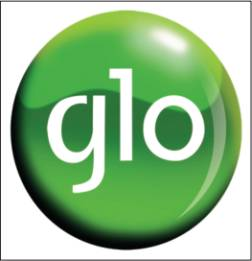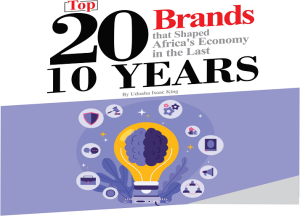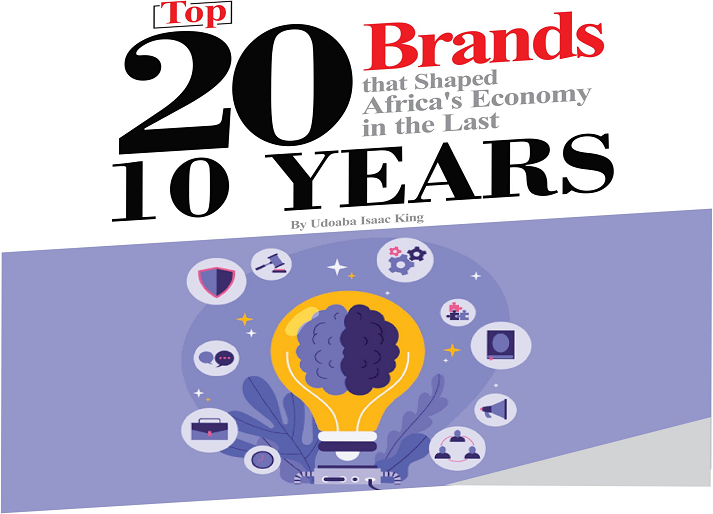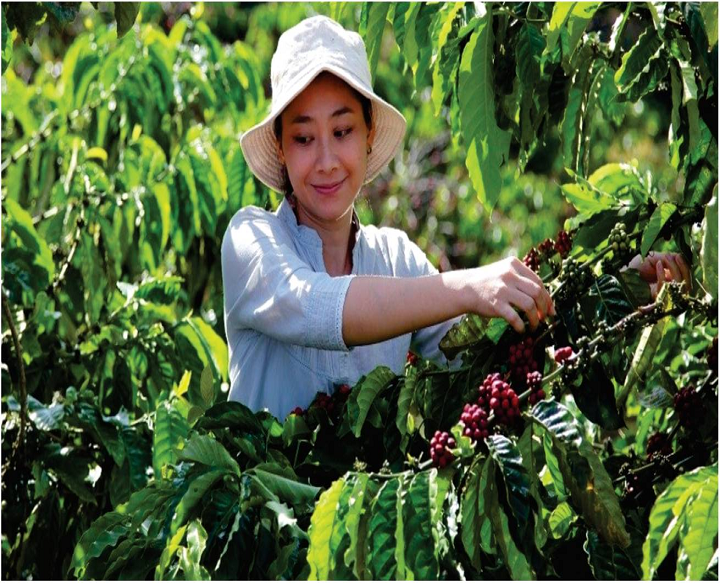Africa is a continent that is blessed with abundant resources, people, culture, structure and history. In time past, a lot of the wealth available in the economy was embedded in brands. And brands have expressly and openly embraced those resources provided but have given the bulk back to people.
We look at top brands that have impacted the African economy, quite tremendously whether financially, economically or otherwise. Examining the important brands profiled, key elements that informing their strengths as giant brands in Africa are highlighted with focus on the positive impacts they have recorded in immediate communities.
Tony Elumelu Foundation
The Tony Elumelu Foundation (TEF) was founded in 2010 by Tony Onyemeachi Elumelu, (CFR). It is the leading champion of entrepreneurship in Africa with an objective to empower men and women across the African continent. Categorically, the foundation has been catalysing economic growth, driving poverty eradication and ensuring job creation, throughout the African continent. The foundation believes the private sector’s role is critical for Africa’s development. Thus, the private sector must create both social and economic wealth. The Tony Elumelu Foundation has impacted Africa’s economy by Funding Entrepreneurs from across 54 African countries; thereby establishing the largest network of entrepreneurs across Africa, creating new jobs, businesses, and directly contributing to the empowerment of over 35,000 women across Africa.
READ MORE: Nigeria Ranks Third After South Africa, Egypt as African Countries with More Developers
The foundation has invested over USD80 million plus as seed capital to support the kick-off and growth of businesses all over Africa. By going as far as providing support through advocacy and sensitisation on COVID-19, 98 percent of entrepreneurs say the programmes and tools of the foundation have helped them to constantly innovate and improve their women across Africa. The foundation has invested over USD80 million plus as seed capital to support the kick-off and growth of businesses all over Africa. By going as far as providing support through advocacy and sensitisation on COVID-19, 98 percent of entrepreneurs say the programmes and tools of the foundation have helped them to constantly innovate and improve their products and services, and consequently staying in business.
United Bank for Africa (UBA)

The United Bank for Africa (UBA) is Africa’s Global bank with a rich history spanning over seven decades. With more than 27 million customers, the aim of UBA is to be a role model for African businesses by creating superior value for all stakeholders, abiding by the utmost professional and ethical standards, and building an enduring institution. With its CSR arm that is committed to being a socially responsible company and role model for all businesses in Africa, the foundation is committed to the socio-economic growth of the communities across Africa, focusing on development in the areas of education, environment, economic empowerment and special projects. Being one of Africa’s leading financial institutions, with operations in 20 African countries and 3 global financial centres: London, Paris and New York, it has helped in generating employment in all these countries as well as building more capacity to ensure better performance and deliver higher returns to customers/shareholders.
Innoson Motors
Nigeria’s first automotive company, Innoson Vehicle Manufacturing (IVM), was founded
by Innocent Chukwuma who is the CEO of a conglomerate of companies in Nigeria. Currently Africa’s only automobile manufacturer, and in a continent containing 54 countries; IVM has impacted Africa’s economy as the vehicle is built to cater to the conditions of West African roads, thus providing a more efficient car for the local market. Also, the increase in inter-African business has created more employment opportunities and increased innovation as ambitious Nigerians and foreign investors see Innoson as the promise of a better tomorrow in a country that currently faces an alarming unemployment rate of roughly 25%. With the intention to produce automotive lines of semi trucks, SUVs, buses, and construction machinery for the betterment of the future, there is a belief that Africa will soon find itself at par with the rapidly growing BRIC countries such as Brazil or India. IMV is a vehicle manufacturing company, but also a rallying machine behind Africa’s development.
StarTimes
StarTimes Group was founded in 1988 by Chinese engineer Pang Xinxing, who is also the company’s current chairman. In 2002, StarTimes began to expand its business to Africa. In 2007, it became the first digital television operator licensed by Rwanda. Since then, StarTimes has established subsidiaries in 30 African countries. Mirroring Nigeria as one of the beneficiaries of the company as a direct-to-home pay-tv service, StartTimes is said to have invested over $220 million in Nigeria, in the last eight years, to boost entertainment and enrich the country’s television viewers’ experiences. StarTimes has impacted Africa in many ways with high density of African employees, huge investment, Furthering a Forum for China Africa Cooperation (FOCAC) gains, and World Cup telecast to Africa, etc. In the past seven seasons, since 2011, it has sustained the tradition of hosting African countries in Beijing for the continent’s digital TV migration, assisting in financing and manpower training, and at the same time making good its business of sustaining its dominant market share in this sector in Africa. Truly, StarTimes targets businesses, but with a friendly approach that keeps both parties, African countries and themselves, winning from the partnership.
Globacom (GLO)
Globacom Limited, commonly known as GLO (Global communication), is a Nigerian multinational
telecommunications company founded on 29 August 2003 by Chief Mike Adenuga. It has over 45 million subscribers (as at December 2018), making it the second largest network operator in Nigeria. In 2011, GLO became the first telecommunication company to build an $800 million high-capacity fibre-optic cable known as Glo-1, a submarine cable from the United Kingdom to Nigeria, making it the first successful submarine cable underlay from the United Kingdom to Nigeria. In the last two decades of GSM services in the country, almost every aspect of the economy has gained a lot from its corresponding technological advancement. This impact has leapfrogged the growth of Nigeria’s telecom industry from 1.5 contribution to the Gross Domestic Product (GDP) in 2001, to over 17% of the GDP in 2021. From banking to information technology to healthcare to sports to entertainment, etcetera. Globacom was the first mobile operator in Africa to launch gateway switches outside the continent to carry international voice and data traffic. This milestone positioned it as a leading provider of telephone services for the rest of the world.
MTN Group
MTN Group Limited, formerly M-Cell, is a South African multinational mobile telecommunications company, operating in many African and Asian countries. The company was founded in 1994 as M-Cell with assistance from the South African government. In 1995, it replaced its then-CEO, John Beck, with Robert (Bob) Chaphe and founder Leena Jaitley. In 2001, the company reported that its controlling shareholder was Johnnie Holdings, and the chairperson was Irene Charnley. In 2002, Phuthuma Nhleko became the CEO, replacing then-CEO Paul Edwards, who had invested in expansion to Nigeria. MTN Group is driven by the core belief to reach the most vulnerable, marginalised, underserved communities and members of society without leaving anyone behind. It believes it can only flourish when the communities and ecosystems in which it operates are healthy, thereby striving to leverage core capabilities towards enabling the socio-economic development of the communities within which they operate.

Youth accounts for over 60% of the population across their markets, it is for this reason that they have shifted their key strategic focus of the Corporate Social Investment (CSI) towards youth empowerment. The approach to CSI has systematically addressed job creation, enhanced competitiveness and driven inclusive growth. In doing so, GLO has ensured that it also emphasises on addressing national priority areas aligned with the National Development Plan of each of our markets. Today MTN Mobile Money is currently working with 400,000 agents, innovating entrepreneurs who leverage mobile money to collect payments. The ability to collect payments digitally is a step toward digitizing a business and being truly innovative.
Nestle Africa
Since the 1880s, Nestle’s condensed milk has traversed the African continent in miner’s rucksacks and continuing today, with hundreds of products available from Cairo to Cape Town. Starting with the first factory in 1927 (in South Africa), it has now increased to twenty-seven factories, plus numerous distribution and management centres.
Nestle’s greatest contribution to Africa is through the impact of core business, with responsible, sustainable operations that create jobs and consolidating. They have employed more than 11500 people; and tens of thousands of additional people are employed as suppliers and distributors in Africa alone, making them one of the biggest recruiter of persons in Africa alone. Through a very long-term business strategy, developing regional and national companies over decades, placing long-term business development over temporary short term returns, Nestle has become a source of stability and economic growth in Africa. Nestle innovation includes: investing in health in the new millennium, helping in creation of good governance, long-term sustainable business practices for Africans, helping vulnerable populations, and even going as far as helping African farmers with free trade. Today, Nestle has witnessed unprecedented growth in many African countries.
Paystack
Paystack is a growth engine for a new generation of innovative, forward looking organizations operating in Africa. They have facilitated modem online and offline payments for Africa that help businesses in Africa get paid by anyone, anywhere in the world. Paystack, a Stripe-like start-up out of Lagos that provides online payment facilities to merchants and others, by way of an API and a few lines of code, is an active company which has impacted Africa where its payment API integrates with tens of thousands of businesses, and in two years it has grown to process 15 percent of all online payments. Its plan is to both continue to grow in its home market as well as expand to more countries, starting with Ghana.
Paystack’s mission is to accelerate digital commerce across Africa, in partnership with customers who represent some of the most forward thinking organizations on the continent, and rewriting much of the fundamental infrastructure that underpins how trade happens.
Flutterwave
The company was founded in 2016 by Iyinoluwa Aboyeji, Olugbenga Agboola, and Adeleke Adekoya and is headquartered in San Francisco, California with operations in Nigeria, Kenya, Ghana, South Africa, and seven other African countries. In 2021, Flutterwave raised a US$170 million Series C funding round. At the time, this was the largest amount ever secured by an African tech start-up and gave it a valuation of over US$1 billion, making Flutterwave a unicorn. Flutterwave may ultimately build one of the most consequential fintech businesses in the world, enabling hundreds of thousands of merchants to transact online and connect Africa to the global economy.
Flutterwave, one of Africa’s leading technology companies, has just announced the hiring of 200 graduate trainees. The announcement came after a month long recruitment process which had 11,000 candidates applying for 200 available positions. Adding 200 employees to the book, a staggering 38% increase in staff, is a sure sign of strength and growth for the company, and as well for the ecosystem in Africa; adding weight to loud thoughts that the African Fintech Ecosystem has long been insulated from global sources of stress, from a range of factors. Another perspective is the one that argues that African Fintechs solve real life problems that customers are willing to pay for, like cross-border payments, remittances, logistics etc.
Coca-cola
The Coca-Cola Company is an American multinational beverage corporation
founded in 1892, and best known as the producer of Coca-Cola. The Coca- Cola Company also manufactures, sells and markets other non-alcoholic beverage concentrates, syrups, and alcoholic beverages. One of the major impact of Coca-cola is the creation of RAIN. RAIN is a Coca-Cola Foundation’s flagship African community programme contributing to helping Africa achieve the United Nation’s Sustainable Development Goals on clean water and sanitation access. RAIN makes catalytic investments to improve the lives of over 6 million people in Africa through a wide range of water-based initiatives, including: Water, Sanitation and Hygiene, Productive Use of Water, and Watershed Protection. They also make waves in different areas such as; 480,000+ Women and Girl empowerment, Helping Communities, and many more. Coca-cola has been giving opportunity through investment and employment in Africa, especially for women. In Mozambique, Coca-Cola has helped more than 20 000 women entrepreneurs launch their own businesses with start-up ice boxes and beverages. In Mozambique, Sabco supported about 45 000 jobs, directly and indirectly, through its business.
Vermeulen, Coco-cola’s representative, said 30 percent of these jobs were held by women. Coca- Cola has a presence in 54 African countries, impacting economies at local, national, and global scales.
Jumia
Jumia is a Pan African technology company that is built around a marketplace, logistics service and payment service. The logistics service enables the delivery of packages through a network of local partners while the payment services facilitate the payments of online transactions within Jumia’s ecosystem. It has partnered with more than 110,000 active sellers and individuals and is a direct competitor to Konga in Nigeria. Jumia, the pan-Africa leading e- Commerce platform, exemplifies this assertion over the last eight years of its operation in Nigeria and 10 other African countries. Its footprints in employment creation, business sustainability for MSMEs and economic growth have been phenomenal. Its consistent investment in physical and network infrastructure and manpower remains a significant contributor to the growth of Nigeria’s economy, and that of Africa as a whole, by promoting adoption of online shopping, digital payment, logistics and supply value chains as veritable lifestyle among the people.
Ethiopian Airlines
Ethiopian Airlines, formerly Ethiopian Air Lines, is the flag carrier of Ethiopia, and is wholly owned by the country’s government. EAL was founded on 21 December 1945 and commenced operations on 8 April 1946, expanding into international flights in 1951. Ethiopia has come a long way since commencing operations in 1945 with a weekly route service between Addis Ababa and Cairo. Early on, the airline recognized that a successful future depended on first developing a far- reaching pan-African route network. One of its major impact is creating new destinations and increased numbers of flights to Europe, the United States of America, Canada, Asia and the Middle East have been launched, just as the airline goes about bringing the world closer to Africa.
Ethiopian Airlines serves 76 international airports (46 in Africa) across five continents and 17 domestic destinations. It has 60 aircraft with an average age of 7 years, the youngest fleet in Africa. The airline employs 7,300 full time workers. It has created 20,000 direct and indirect jobs. Ethiopian Airlines as a pan-African airline first and foremost, has Africa its home market, as its focus; bringing the continent together and closer to the world.
Air Peace
Air Peace is a private Nigerian airline founded in 2013 with its head office in Ikeja, Lagos State, Nigeria, the flagship carrier and the largest airline in Nigeria and West Africa. Air Peace, which provides passenger and charter services, serves the major cities of Nigeria and flies to several West African destinations and the Middle East. The airline also established a subsidiary, Air Peace Hopper, in 2018. Air Peace was founded by a Nigerian lawyer and 21
businessman, Allen Onyema in 2013.

Onyema claims that he started the airline with the intention of using it as an engine to provide economic opportunities to Nigerian youths. Air Peace is one of Onyema’s economic interventions that are predominantly poised to solve the unemployment challenge in Nigeria and Africa at large. At several public events, Onyema has emphasised that his motivation for venturing into aviation was to create employment opportunities for Nigerians, and this singular desire also underpins some of the airline’s extraordinary footprints. From setting sail with a record fleet of seven aircraft to becoming West and Central Africa’s largest carrier, Air Peace has been on a steady growth path, which has had a positive impact not only on Nigeria’s economy but also that of Africa. Currently, Air Peace has in its employ over 3,000 direct and indirect staff who are mostly Nigerians. You can imagine the multiplier effects of providing means of livelihood for this large number of people. During the reception ceremony for the first E195- E2 delivered on January 28, 2021, Onyema disclosed that the 13 Embraer 195-E2s would create 8,000 jobs.
This means that 8,000 Nigerians will become gainfully employed and life will become better for their dependants. Their standard of living will improve, and they will be better positioned to contribute meaningfully to the economic growth of Nigeria. Second, revenue will be generated as Embraer will be paying taxes to the Nigerian government and a lot of tax income will be made annually. Third, it will help indigenous airlines who operate Embraer jets, as they will not need to fly overseas for maintenance checks, and millions of dollars will be saved. One is not oblivious of the corresponding technology transfer that will result from having an Embraer maintenance facility in Nigeria, as other African airlines will fly in their Embraer planes for maintenance. The cumulative effect of this will be a plethora for both Nigeria’s aviation and its economy at large.
Airtel/ Zain
Airtel Networks Limited (Airtel Nigeria) is a leading mobile telecommunications company in Nigeria. The company was founded in 2001 as Econet Nigeria and was awarded Digital Mobile License (DML) for communication service in Nigeria. It made history on August 5, 2001 by becoming the first telecommunications service provider to launch commercial GSM services in Nigeria. In 2004, Vodacom took charge of the company as management changed hands. Later in 2004, Vee Networks took the reins of the company and became known as Vmobile. In May 2006, Vmobile was acquired by Celtel.
However, in 2008, Zain Group, another telecommunications company acquired all Celtel International’s shares of over $3 billion. As a result of this acquisition, all operations of Celtel Africa was rebranded from Celtel to Zain. But in 2010, Bharti Airtel, the parent company of Airtel Nigeria, completed the acquisition of Zain Group’s Africa business in a $10.7 billion transaction. According to subscribers’ statistics released by Nigerian Communications Commission (NCC) on 30 August 2019, Airtel Nigeria has 26.8% mobile telephone market share and 46.8 million subscribers.
The company is a member of Airtel Africa, the holding firm for Bharti Airtel’s operations in 14 countries in Africa. The great impact by Airtel can be recognised in Africa; Airtel Africa employs more than 3,300 people across Africa, with another 1.6 m people earning through working with Airtel Africa as entrepreneurs and in its distribution network. Airtel Africa’s voice, data and mobile money services are driving growth and Transforming Customers’ lives. Thus, Airtel Africa provides voice services to 110.6m customers, data services to 35.4m customers and mobile money services to 18.3m customers. The company had a turnover of $3.4bn in the last financial year.
The introduction of wireless home broad band has further helped service customers’ evolving needs. Airtel Africa’s mobile money services provide customers with exclusive assured float and a growing number of strategic partnerships, enabling cross-border money transfers. Airtel Africa has also launched a virtual card, further boosting financial inclusion. Airtel Africa is listed on the London and Nigerian stock exchanges.
Vodacom
Vodacom Group Limited is a South- Western African mobile communications company providing voice, messaging, data and converged services to over 55 million customers. Vodacom is striving to enable, support and accelerate sustainable innovation across the continent which can create a better future for all. More than half of the world has moved online to access products and services they used to seek out physically in the pre- COVID-19 times. In March 2020, at the start of the pandemic, global internet usage surged by 50% to 70%. It is, therefore, clear that participation in the growing global digital economy is crucial and it will allow governments to have a positive impact on businesses, especially small and medium-sized enterprises (SMEs), and consequently individual citizens. It is essential for AU member states to be active, meaningful participants in this new environment, where data is the key currency. Vodacom is renowned for being one of the most dynamic tech companies in Africa, as is evidenced by our historic firsts such as the first network operator to launch 3G, 4G and 5G in Africa and with continued investment in world-class digital solutions that leverage cloud, hosting, managed security, IoT and Big Data. Their consecutive first- and second-place rankings in the South Africa Innovation League bear testament to the strong focus on Vodacom’s innovative culture which is embraced by our various business divisions and leaders.
Cowbell
Cowbell is a beverage that is 22 produced by Promasidor Nigeria Limited, a consumer-packaged goods company headquartered in Isolo, Lagos. It is a subsidiary of South Africa based Promasidor Holdings. The firm’s major brands include Cowbell milk, Loya milk, Sunvita cereal, Onga seasoning and Top Tea beverages. Cowbell, Our Milk, has become synonymous with quality and value. The vision of providing quality, affordable milk powder to the people of Africa has made Cowbell one of Africa’s best loved brands. Regular additions to the Cowbell product range are proof of their commitment to continually provide innovative and value-added milk products. They have extended the brand into flavoured milks, UHT, condensed and evaporated, as well as processed cheese.
7-Up
Seven-up Bottling company started business in Nigeria in 1960 as a limited liability company. A Lebanese, Mohammed El-Khalil who came to Nigeria in 1926 founded the company. The Seven-Up bottling company Pic. is one of the largest independent manufacturer and distributor of well- known and widely consumed brands of soft drinks in Nigeria from nine manufacturing plants. Seven-Up Bottling Company Limited (SBC) has restated its commitment to developing a pool of well-trained young global leaders able and capable of providing transformational leadership that will impact the political economy of Nigeria and the African continent in no distant future.
CHI Pharmaceuticals
CHI Pharmaceuticals is renowned for the high standards delivered to their customers through the production of quality pharmaceuticals manufactured at their WHO certified plant located in Ajao Estate, Lagos. CHI Pharmaceuticals holds international quality certifications from the following global agencies: WHO, UNICEF, USAID & USP. Over the years, they have demonstrated competence in the area of supply and distribution of pharmaceutical products to both the domestic and international markets. They distribute their own products and those of third-party companies and believe medicines should be accessible to all. Thus, they are committed to facilitating the widespread availability of affordable and high quality essential medicines. Some of their Achievements include: the youngest pharmaceutical company in Africa to obtain WHO GMP certification. Pioneer local manufacturer of ORS, Zinc Sulphate and Resperidone (Antipsychotic). Pioneer of the first ever public-private partnership in the Roll Back Malaria (RBM) Initiative. Provision of local supply alternatives medicines to international donor agencies to meet UN Sustainable Development Goals (SDGs).
Royal Friesland Campina
Royal Friesland Campina N.V. is aDutch multinational dairy cooperative which is based in Amersfoort, Netherlands. It is the result of a merger between Friesland Foods and Campina on 31 December 2008. The European Commission approved this merger on 17 December 2008, on the condition that the new company divest some activities. They are the dairy leader and makers of Peak, Three Crowns, Coast, Olympic, and Nunu brands of milk, recording a net operating profit of N22billion, up 13 percent from 19.4 percent recorded in 2020. It is the world’s largest dairy co-operative and one of the top 5 dairy companies in the world with annual revenue of 11 billion euros (2016).

Friesland Campina has branch offices in 33 countries and employs a total of 21,927 people. With their dairy development activities they train and improve the skills of dairy farmers in Asia, Africa and Eastern Europe with regard to sustainable and efficient farming processes. Friesland Campina supports local (often small) dairy farms in China, Indonesia, Malaysia, Nigeria, Pakistan, Romania, Thailand and Vietnam. Their goal is to improve the quality of their milk, increase the productivity per cow and support farmers in gaining access to the market. In order to achieve those goals, they focus on trainings and knowledge sharing, partnerships and projects aimed at improving the dairy value chain, such as the upgrading of milk collection centres
Multichoice (DStv)
Since 1995, MultiChoice otherwise the mother company of DStv, has been quietly getting on with the business of bringing people world class entertainment. But more importantly, they have taken to heart the responsibility of uplifting their immediate communities and country.
Fundamentally, Multichoice entertains, informs and empowers African communities that inspire and build its business in return. Hence Multichoice is proud to say that it uses the power of entertainment to enrich lives. Furthermore, Multichoice has over the years, attempted to achieve this goal through showcasing compelling local and international stories, which bring people together around a shared passion.
As Africa’s leading entertainment company, Multichoice creates and secures the rights to phenomenal content from all over the world. This gets delivered through their Direct- To-Home (DTH), Digital Terrestrial Television (DTT) and online video entertainment services.
The Entertainment Platforms:
The various entertainment platformsof Multichoice are DStv, GOtv and Showmax which are basically a hub for approximately 14 million people across 50 countries. Through Irdeto, Mutichoice is a world leader in digital platform security for video entertainment, video games, connected transport and IoT connected industries.
The extra-ordinary feat achieved by Multichoice in the entertainment industry has been quite outstanding. This is much with thanks to their phenomenal products and services. Hence, the brand has been able to create thousands of jobs and invest heavily in Africa’s film and TV industry, as well as contribute to the economies of the countries where they operate. Unlike other entertainment providers, Multichoice and DStv are rooted in the countries where the customers live. Every story the brand tells and every decision it makes have their numerous customers at heart.
In conclusion, it is very visible and perceptible enough to know how blessed Africa has become with all the continent’s top brands making impact through the use of innovative businesses to drive high volumes of revenue from their productive enterprises, creating more job opportunities for people, while embarking on humanitarian projects that are impacting the economy positively in term of contribution to the GDP of each African country. With more brands coming our way in the very near future, we expect Africa to build on and expand the economic base of the continent by creating enabling supportive environments for businesses and start-ups thrive while continually supporting the brands to be able to participate, wholesomely, in developing the nations of Africa, thereby making the continent a better place for people to live and survive in, comfortably.




